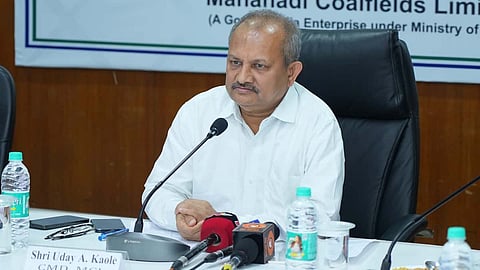

Sambalpur: Mahanadi Coalfields Limited (MCL) is intensifying efforts to substitute imported coal with washed domestic coal in coastal power plants, its Chairman and Managing Director (CMD) Uday A Kaole said, aligning with the government’s push to cut coal imports. “We need to ensure washed coal replaces the imported coal used in coastal power plants,” said the MCL CMD. The move aligns with the government’s push to cut coal imports, especially in imported coal-based (ICB) thermal stations situated near ports.
MCL, a Coal India subsidiary based in Odisha, is expanding its washing capacity and leveraging the Rail-Sea-Rail (RSR) mode of transport to make washed coal more accessible to power producers along the coast. Kaole said that MCL has been reaching out to Imported Coal-based (ICB) power plants located along the country’s coast to get them to use washed coal.
Mahanadi Coalfields started operating its first 10 Million Tonnes per Annum (MTPA) Ib Valley coal washery in 2024. It plans to add another 27 MTPA capacity through two new projects: 12 MTPA at Kulda Opencast Project in Ib Valley coalfields and 15 MTPA at Balram Opencast Project (OCP) in Talcher coalfields. The two projects will collectively take MCL’s coal washing capacity to 37 MTPA.
Despite washed coal being more expensive than raw coal, Kaole said demand from the power sector remains strong. “Power plants are really eager to take this washed coal. We do not have any dearth of customers as of now. We are adding 27.5 MT capacity in future to the current washing capacity of 10 MT,” said the CMD. MCL is currently selling washed coal at a basic rate of Rs 2,260/tonne. By contrast, unwashed coal sold to the power sector ranges between Rs 768 and Rs 906 per tonne depending on the grade. While the upfront cost of washed coal is higher, it has ash content below 34 percent and results in lower fly ash disposal costs for power producers — a factor increasingly relevant given tightening environmental norms.
The Ministry of Coal has been promoting RSR — which combines rail and coastal shipping — as a more sustainable, cost-efficient way to move coal. It has set a target of transporting 120 MT of coal annually via RSR by FY2030. MCL, the coal PSU which is located in close proximity to ports on the eastern coast and which contributes the largest chunk of coal production to its parent, Coal India Limited’s (CIL), output, is set to play a key role in meeting the target set out by the Centre.
Since, 2022-23, MCL has been shipping 40 MT of coal through RSR mode. In FY 2024-25, the Odisha-based PSU moved 45.4 MT of coal via RSR mode. Kaole noted that currently bulk of this quantity is being shipped through Paradip port which has a modern, mechanised coal handling plant with a capacity of 42 MTPA. When such facilities come up at other ports from where MCL is shipping its coal via RSR to thermal power plants — Dhamra, Vizag, Gangavaram and Gopalpur — the quantities will go up, said the MCL CMD. Some of the power sector consumers that are currently consuming coal shipped via RSR route include state-run NTPC, APGENCO and MAHAGENCO.
Taking washed coal to ICB thermal power plants via RSR route is the next thing on MCL’s agenda, but it’s a tricky task. The Ministry of Coal has been reaching out to ICB plants and has held stakeholder consultations with them to get them to substitute imported coal with domestic coal. According to officials, many ICB plants are hesitant because their boilers are designed for low-ash coal. Indian non-coking coal, by contrast, has high ash content. Also, most of India’s coal reserves consists of high-ash non-coking coal and India is keen on using the fossil fuel to meet its growing power demand until renewable energy is ready to pick-up the load along with battery storage.
“Any change comes with a lot of reluctancy. We need to take this reluctance in stride. Through washing, ash content has been reduced. And we need to ensure that this washed coal replaces the imported coal in coastal power plants. It will come with reluctancy, resistance and all those things. But we need to work on it. And we are working on it,” said Kaole.
